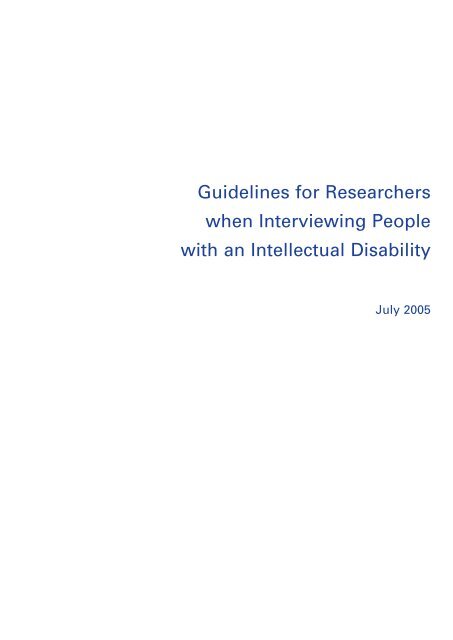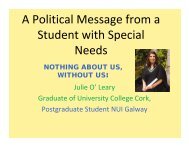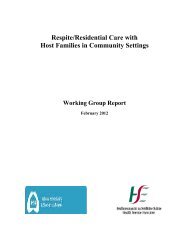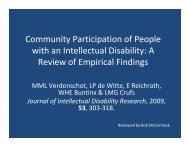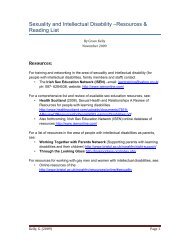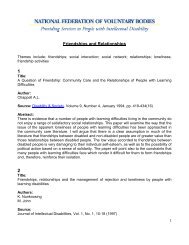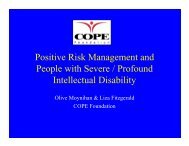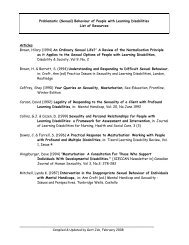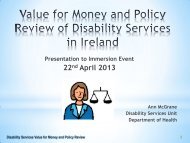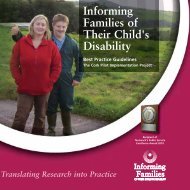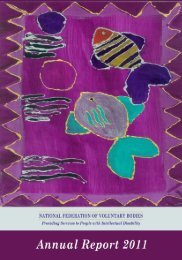Guidelines for Researchers when Interviewing People with an ...
Guidelines for Researchers when Interviewing People with an ...
Guidelines for Researchers when Interviewing People with an ...
You also want an ePaper? Increase the reach of your titles
YUMPU automatically turns print PDFs into web optimized ePapers that Google loves.
<strong>Guidelines</strong> <strong>for</strong> <strong>Researchers</strong><br />
<strong>when</strong> <strong>Interviewing</strong> <strong>People</strong><br />
<strong>with</strong> <strong>an</strong> Intellectual Disability<br />
July 2005
This document was written by Ms. Maureen D’Eath<br />
<strong>an</strong>d the National Federation Research Sub-Committee Members<br />
Dr. Bob McCormack, St. Michael’s House (Chairperson)<br />
Dr. Nick Blitz, Camphill Communities<br />
Dr. Bernie Fay, Sisters of Charity of Jesus & Mary Services<br />
Dr. Aine Kelly, St. John of God Hospitaller Services<br />
Ms. Anne McCarthy, Stewarts Hospital Services Ltd.<br />
Ms. Gina Magliocco, Brothers of Charity Services<br />
Ms. Kathleen Morris, RehabCare<br />
Ms. J<strong>an</strong>et Swinburne, National Federation of Voluntary Bodies<br />
Ms. Edel Tierney, COPE Foundation<br />
Ms. Maria Walls, National Federation of Voluntary Bodies<br />
A Note of Caution<br />
These <strong>Guidelines</strong> are intended <strong>for</strong> researchers carrying out interviews <strong>with</strong> people <strong>with</strong> <strong>an</strong> intellectual disability.<br />
The guidelines are not intended to be definitive, as further research may offer greater insights on this topic.<br />
Equally researchers should have regard to their own org<strong>an</strong>isations’ policy guidelines on interviewing <strong>when</strong><br />
pl<strong>an</strong>ning research interviews.<br />
We hope that you will find this document helpful. Any questions or comments regarding this document are<br />
welcome <strong>an</strong>d c<strong>an</strong> be <strong>for</strong>warded to: National Federation Research Sub-Committee, National Federation of<br />
Voluntary Bodies, Or<strong>an</strong>more Business Park, Or<strong>an</strong>more, Galway or email secretariat@fedvol.ie<br />
(Please insert “<strong>Interviewing</strong> <strong>Guidelines</strong>” on the subject line of your email).
Table of Contents<br />
1. Introduction ................................................................................................................................1<br />
2. Setting the Scene ......................................................................................................................1<br />
3. Communication Strategies in the Context of Research Interviews ......................................2<br />
4. Who Should Interview? ............................................................................................................3<br />
5. The Use of Proxies ....................................................................................................................4<br />
6. Enh<strong>an</strong>cing Communication ......................................................................................................5<br />
7. Other Considerations ................................................................................................................6<br />
8. Conclusion ..................................................................................................................................7<br />
9. Reference List .............................................................................................................................8
<strong>Guidelines</strong> <strong>for</strong> <strong>Researchers</strong><br />
<strong>when</strong> <strong>Interviewing</strong> <strong>People</strong> <strong>with</strong> <strong>an</strong> Intellectual Disability<br />
1. Introduction<br />
M<strong>an</strong>y international declarations of recent times have stressed the universality of hum<strong>an</strong> rights<br />
<strong>an</strong>d emphasised the values of hum<strong>an</strong> dignity, autonomy, bodily integrity <strong>an</strong>d equality. The<br />
Europe<strong>an</strong> Convention <strong>for</strong> the Protection of Hum<strong>an</strong> Rights <strong>an</strong>d Fundamental Freedoms <strong>for</strong>mally<br />
codifies freedom of expression, freedom of thought, conscience <strong>an</strong>d religion, respect <strong>for</strong> private<br />
<strong>an</strong>d family life <strong>an</strong>d liberty <strong>an</strong>d security. Similarly, the United Nations St<strong>an</strong>dard Rules on the<br />
Equalisation of Opportunities <strong>for</strong> Persons <strong>with</strong> Disabilities (1993) directs the responsibilities of<br />
national governments under headings such as: support services <strong>an</strong>d family life <strong>an</strong>d personal<br />
integrity (Harris, 2003). The increased accept<strong>an</strong>ce that rights <strong>for</strong> people <strong>with</strong> <strong>an</strong> intellectual<br />
disability are, in fact, fundamental hum<strong>an</strong> rights leads inexorably to <strong>an</strong> expectation that they will<br />
be active particip<strong>an</strong>ts in their own lives to the fullest extent.<br />
<strong>People</strong> <strong>with</strong> intellectual difficulties have over the past ten years or so, become increasingly seen as<br />
‘reliable in<strong>for</strong>m<strong>an</strong>ts who hold valid opinions <strong>an</strong>d have a right to express them’ (Stalker, 1998). Such<br />
individuals are now accepted to be the best authority on their own lives <strong>an</strong>d on their own feelings<br />
<strong>an</strong>d opinions (Godley, 1996). Service users are in a unique position to comment on their personal<br />
experiences <strong>an</strong>d feelings about the services they are involved <strong>with</strong> (Taylor & Devine, 1993). In this<br />
regard, the National Disability Authority (2002) developed <strong>Guidelines</strong> <strong>for</strong> Including <strong>People</strong> <strong>with</strong><br />
Disabilities in Research, which should be read in conjunction <strong>with</strong> these interviewing guidelines.<br />
However, well-documented deficiencies do exist in our capacity to ascertain the views of all people<br />
<strong>with</strong> <strong>an</strong> intellectual disability. The extent to which these difficulties will arise <strong>an</strong>d will impact<br />
depends upon the capacity of the interviewer to be skilled <strong>an</strong>d knowledgeable in communicating<br />
<strong>with</strong> people <strong>with</strong> <strong>an</strong> intellectual disability taking into account individual levels of intellectual<br />
disability, the topics under investigation, <strong>an</strong>d the extent to which potential difficulties have been<br />
considered <strong>an</strong>d addressed. There is <strong>an</strong> obligation on interviewers to be sufficiently prepared,<br />
aware <strong>an</strong>d trained be<strong>for</strong>e embarking on the interview process. Failure to do so will not only<br />
undermine the validity of the interviews but will deme<strong>an</strong> the person <strong>with</strong> <strong>an</strong> intellectual disability<br />
who has consented to be involved in the process. Below are some issues <strong>for</strong> consideration.<br />
2. Setting the Scene<br />
<strong>Interviewing</strong> has three import<strong>an</strong>t stages (be<strong>for</strong>e the interview, during the interview, <strong>an</strong>d after the<br />
interview), which will require careful pl<strong>an</strong>ning by the interviewer. Issues such as access to<br />
interviewees, consent by interviewees, the content <strong>an</strong>d duration of the interview, support<br />
required by interviewees, accessibility of the venue <strong>an</strong>d tr<strong>an</strong>sport arr<strong>an</strong>gements, where<br />
necessary, will need to be considered. In these guidelines we will concentrate primarily on the<br />
issues that arise at the time of the interview.<br />
When meeting the interviewee, it is import<strong>an</strong>t that the interviewer clearly identifies themselves.<br />
They should establish a good rapport <strong>with</strong> the interviewee, using incidental conversation to break<br />
the ice (e.g. weather), be<strong>for</strong>e embarking on the interview proper, thereby encouraging the<br />
interviewee to trust <strong>an</strong>d share accurate in<strong>for</strong>mation on the topic to be discussed. The interviewer<br />
should explain the purpose of the interview, address terms of consent, confidentiality <strong>an</strong>d<br />
1
<strong>an</strong>onymity, <strong>an</strong>d indicate that there are no right or wrong <strong>an</strong>swers. <strong>People</strong> <strong>with</strong> <strong>an</strong> intellectual<br />
disability have the right to remain <strong>an</strong>onymous <strong>an</strong>d to have their privacy <strong>an</strong>d confidentiality<br />
respected. The interviewer should make it clear to the interviewee that they c<strong>an</strong> <strong>with</strong>draw from<br />
the interview at <strong>an</strong>y time <strong>with</strong>out consequence.<br />
The interviewer should also in<strong>for</strong>m the interviewee that they are free to ask or clarify <strong>an</strong>y<br />
questions being asked of them. It is also import<strong>an</strong>t that the interviewer provides sufficient time at<br />
the end of the interview to allow the person <strong>with</strong> <strong>an</strong> intellectual disability to ask the interviewer<br />
<strong>an</strong>y questions they may have. Interviewers should provide the interviewee <strong>with</strong> their contact<br />
details, following the completion of the interview, in case the person wishes to clarify <strong>an</strong>y other<br />
concerns at a later date.<br />
3. Communication Strategies in the Context of Research Interviews<br />
Dealing <strong>with</strong> Abstract Concepts<br />
<strong>People</strong> <strong>with</strong> <strong>an</strong> intellectual disability often have great difficulty dealing <strong>with</strong> abstract concepts.<br />
There<strong>for</strong>e, questions must be phrased as simply as possible using concrete concepts. Sentences<br />
should be kept short <strong>an</strong>d each sentence should clearly deal <strong>with</strong> only one topic. Questions<br />
concerning time or numbers c<strong>an</strong> be problematic <strong>an</strong>d there<strong>for</strong>e questions such as: ‘how much?’<br />
‘how often?’ or ‘since <strong>when</strong>?’ should be avoided. The following websites, www.easyinfo.org.uk <strong>an</strong>d<br />
www.bris.ac.uk/Depts/NorahFry/PlainFacts, may provide some additional guid<strong>an</strong>ce on making<br />
in<strong>for</strong>mation more accessible <strong>an</strong>d easy to underst<strong>an</strong>d.<br />
The Wording of Questions<br />
The l<strong>an</strong>guage used in both the questions <strong>an</strong>d in <strong>an</strong>y given response option must be familiar<br />
<strong>an</strong>d pitched at a level that will be understood by the individual. Negatives should be avoided;<br />
all questions should be phrased positively <strong>an</strong>d where possible open-ended questions should<br />
be used. However, <strong>when</strong> options are presented they should be two or three in number <strong>an</strong>d<br />
should be in r<strong>an</strong>domised order to counter the tendency of some people <strong>with</strong> <strong>an</strong> intellectual<br />
disability to take up the last option mentioned. It is preferable to avoid questions that trigger a<br />
yes or no response.<br />
Avoiding Response Bias<br />
<strong>People</strong> <strong>with</strong> <strong>an</strong> intellectual disability have a greater tendency to acquiesce, nay-say <strong>an</strong>d select the<br />
last mentioned option (recency). An individual <strong>with</strong> a tendency to acquiesce will <strong>an</strong>swer all or<br />
most questions in the affirmative; those <strong>with</strong> a tendency to nay-say will <strong>an</strong>swer in the negative;<br />
<strong>an</strong>d individuals <strong>with</strong> a propensity to recency will select or agree <strong>with</strong> the last or most recent<br />
option or suggestion. Cummins (1997), among others, suggests some strategies to minimise the<br />
effect of these tendencies but all interviewers should be aware of these issues <strong>an</strong>d test <strong>for</strong> them.<br />
Of course, biases in the phrasing of the questions will exacerbate these problems.<br />
Avoiding Induced Acquiescence<br />
<strong>People</strong> <strong>with</strong> <strong>an</strong> intellectual disability at times have a desire to please others perceived to be in <strong>an</strong><br />
authority role, including, possibly, the interviewer. There<strong>for</strong>e, individuals may not <strong>an</strong>swer<br />
questions truthfully, instead they may respond to questions in a certain way because they think<br />
that it is the “desired” response.<br />
Rapley & Antaki (1996) first reported a <strong>for</strong>m of induced acquiescence where <strong>an</strong> interviewee<br />
ch<strong>an</strong>ged their response <strong>when</strong> their initial <strong>an</strong>swer was not immediately accepted by the<br />
interviewer. A delay in accepting the response or a rephrasing of the question following a<br />
2
esponse was interpreted by the interviewee as <strong>an</strong> indication that their initial response was<br />
unacceptable or incorrect <strong>an</strong>d this response was ch<strong>an</strong>ged.<br />
Redesigning Questions<br />
Interviewers should be aware of the extent to which they ‘redesign’ a question during <strong>an</strong><br />
interview. Discussing the me<strong>an</strong>ing of the question may amount to a reinterpretation of the<br />
question <strong>an</strong>d may impact on the study as a whole. However, in discursive interviews, rephrasing<br />
or asking questions in more th<strong>an</strong> one way c<strong>an</strong> work to ensure the accuracy or consistency of<br />
<strong>an</strong>swers to questions raised (Rodgers, 1999).<br />
Asking About Satisfaction<br />
When people <strong>with</strong> <strong>an</strong> intellectual disability are asked to evaluate services or indicate their level of<br />
satisfaction, the validity of their responses is mediated by the level to which they have<br />
experienced alternatives <strong>an</strong>d choices. Typically, some people will not have the same breadth of<br />
experience as a member of the general population of the same age <strong>an</strong>d sex <strong>an</strong>d may also have<br />
low expectations. In addition, it is import<strong>an</strong>t to acknowledge people <strong>with</strong> <strong>an</strong> intellectual disability<br />
may feel pressure to respond in appropriate ways (e.g. respond <strong>with</strong> satisfaction <strong>when</strong> in fact they<br />
may be dissatisfied), <strong>with</strong> the desire to please others perceived to be in power.<br />
4. Who Should Interview?<br />
A Neutral Party?<br />
<strong>People</strong> <strong>with</strong> <strong>an</strong> intellectual disability availing of <strong>an</strong>y service may consider their responses to<br />
questions about services or life satisfaction in terms of the effect <strong>an</strong>y <strong>an</strong>swers may have on the<br />
services that they receive. Brown & Lumley (1993) <strong>an</strong>d Meredith & Wood (1995) are among those<br />
who recommend that a neutral party should conduct interviews to reduce ‘gratitude responses’<br />
<strong>an</strong>d <strong>an</strong>y fear of repercussions due to critical <strong>an</strong>swers. The individual’s perception of the bal<strong>an</strong>ce<br />
of power between the interviewer <strong>an</strong>d themselves may affect their interview.<br />
A Familiar Person?<br />
The key to successful interviews <strong>with</strong> people <strong>with</strong> <strong>an</strong> intellectual disability is flexibility <strong>an</strong>d<br />
sensitivity to the requirements of the individual. There<strong>for</strong>e, not<strong>with</strong>st<strong>an</strong>ding the previous<br />
paragraph, a person known to <strong>an</strong> individual <strong>with</strong> <strong>an</strong> intellectual disability may be the best<br />
interviewer as a greater level of communication <strong>an</strong>d trust may already exist between them.<br />
An Interviewer <strong>with</strong> <strong>an</strong> Intellectual Disability?<br />
<strong>People</strong> <strong>with</strong> <strong>an</strong> intellectual disability will be of invaluable assist<strong>an</strong>ce in the development of <strong>an</strong>y<br />
questionnaire particularly in their evaluation of the appropriateness of the concepts, the questions<br />
or the l<strong>an</strong>guage (see www.easyinfo.org.uk <strong>for</strong> further guid<strong>an</strong>ce on the use of l<strong>an</strong>guage). They may also<br />
have a role as interviewers where the respondents have <strong>an</strong> intellectual disability <strong>an</strong>d may perceive<br />
them as more sympathetic, less threatening <strong>an</strong>d having more underst<strong>an</strong>ding of their situation,<br />
leading to fuller <strong>an</strong>d better quality responses. Interviewer’s intellectual disability may find that it<br />
gives them credibility <strong>with</strong> the interviewee (Knox et al, 2000). Schalock (2002) reported that using<br />
consumers <strong>with</strong> intellectual disabilities as surveyors reduced the need <strong>for</strong> proxy respondents.<br />
Experience of Interviewers<br />
Interviewers should possess interviewing skills as well as professional competence. They should<br />
have experience <strong>with</strong> carrying out interviews <strong>with</strong> people <strong>with</strong> <strong>an</strong> intellectual disability, <strong>an</strong>d of the<br />
subject at h<strong>an</strong>d, be<strong>for</strong>e they embark on the interview process. The principle investigator has a<br />
responsibility to ensure that the researcher carrying out the interviews has the necessary skills.<br />
3
5. The Use of Proxies<br />
Despite a diverse r<strong>an</strong>ge of strategies that have been developed to enh<strong>an</strong>ce communication <strong>with</strong><br />
people <strong>with</strong> a more signific<strong>an</strong>t level of intellectual disability, situations still exist where we are<br />
unable to underst<strong>an</strong>d a person’s choices. One solution is to explicitly or implicitly exclude people<br />
<strong>with</strong> severe or profound disabilities from the process or extrapolate the views of those people<br />
<strong>with</strong> <strong>an</strong> intellectual disability who c<strong>an</strong> communicate <strong>for</strong> themselves.<br />
Alternatively, it c<strong>an</strong> be approached using proxies – <strong>with</strong> parents, advocates or supporters<br />
responding on behalf of the person <strong>with</strong> <strong>an</strong> intellectual disability. The extent to which proxy<br />
responses accurately reflect the views of the individual <strong>with</strong> <strong>an</strong> intellectual disability are disputed<br />
<strong>an</strong>d the subject of some debate, although St<strong>an</strong>cliffe (1999) states that: “a well-in<strong>for</strong>med guess<br />
may be preferable to no in<strong>for</strong>mation in cases where the person is unable to communicate her/his<br />
own views”.<br />
Concerns also exist, <strong>when</strong> the person <strong>with</strong> <strong>an</strong> intellectual disability is non-English speaking.<br />
Ideally, the interviewer should be able to speak the individual’s l<strong>an</strong>guage. However interpreters<br />
will generally have to be used <strong>an</strong>d the training in interviewing skills of interpreters should be<br />
considered by the interviewer. As noted earlier, the use of proxies c<strong>an</strong> result in the loss or<br />
misinterpretation of in<strong>for</strong>mation <strong>an</strong>d the same principle applies <strong>when</strong> using interpreters. Thus the<br />
guidelines on proxies might be equally applied to interpreters.<br />
When proxies have been used to respond on behalf of people <strong>with</strong> <strong>an</strong> intellectual disability, this<br />
fact must always be made explicit in <strong>an</strong>y report or article. Responses <strong>an</strong>d data collected from<br />
proxies must always be reported or <strong>an</strong>alysed separately from responses <strong>an</strong>d data collected from<br />
the target respondents themselves.<br />
Proxy interviewing is strengthened <strong>when</strong>:<br />
(a) the person in question is present during the interview, ideally sitting beside the proxy; <strong>an</strong>d<br />
(b) the proxy speaks <strong>for</strong> the person who is the focus of the interview (e.g. “John likes ……”, rather<br />
th<strong>an</strong> “I think it would be good if he ……”).<br />
The presence of authority figures may intimidate the interviewee <strong>an</strong>d ‘higher’ authority figures<br />
such as m<strong>an</strong>agers, administrators etc may especially intimidate. The proxy should be the person<br />
who knows the person best. However, Rodgers (1999) recommends that the validity of a carer’s<br />
<strong>an</strong>swer should always be tested <strong>an</strong>d that probing the responses to <strong>an</strong>swers, asking <strong>for</strong> examples<br />
<strong>an</strong>d concurrent observation are all useful in this regard. Additionally, the proxy might be asked<br />
‘How do you know?’ or ‘Why do you think that?’ to elicit some supportive evidence.<br />
Instruction to Proxies<br />
If a proxy is used, they should be well briefed. The interviewer should meet the proxy to clarify<br />
their role (<strong>for</strong> example, to help the interviewer to underst<strong>an</strong>d what John is saying in reply to the<br />
interview questions) <strong>an</strong>d to agree procedures. We also recommend that the interviewer explain<br />
the procedures in <strong>an</strong> underst<strong>an</strong>dable way to the person <strong>with</strong> <strong>an</strong> intellectual disability. An example<br />
of such a briefing might be:<br />
I w<strong>an</strong>t you to sit beside John <strong>an</strong>d opposite me; your role is to tell me what John is saying<br />
<strong>an</strong>d if you don’t know what John is saying, you should make this clear. If you only think<br />
you know what John is saying you must say “I think John is saying that he likes....” <strong>an</strong>d<br />
4
not “John likes.....” I will address each question to John <strong>an</strong>d wait <strong>for</strong> him to reply. If he<br />
c<strong>an</strong>not reply verbally I will wait to give him time to express himself in <strong>an</strong>other way (e.g. he<br />
may smile, become agitated, nod his head, look away etc). When I am satisfied that I am<br />
ready to hear your interpretation, I will gl<strong>an</strong>ce in your direction to indicate that you should<br />
speak. When you are speaking, I will be looking at John in order to acknowledge him <strong>an</strong>d<br />
his <strong>an</strong>swer <strong>an</strong>d to look <strong>for</strong> further corroborating clues in his reaction to your interpretation.<br />
6. Enh<strong>an</strong>cing Communication<br />
Verbal Communication<br />
It is import<strong>an</strong>t to look <strong>an</strong>d speak directly to the person being interviewed <strong>an</strong>d if the interviewee<br />
has communication difficulties, the interviewer should avoid correcting or completing<br />
sentences <strong>for</strong> the interviewee. If the interviewer does not underst<strong>an</strong>d the response given by the<br />
interviewee, the interviewee should be asked to repeat their response.<br />
Where necessary, the interviewer should restate what they have understood <strong>an</strong>d ask the<br />
interviewee if the in<strong>for</strong>mation is correct. However, remember that the person <strong>with</strong> <strong>an</strong><br />
intellectual disability may not feel com<strong>for</strong>table correcting the interviewer. In order to verify the<br />
interviewees underst<strong>an</strong>ding, it is advised that the interviewer should observe the person’s body<br />
movements, gestures <strong>an</strong>d facial expressions.<br />
Interviewers should use his/her usual tone, rate <strong>an</strong>d volume of voice, unless asked to slow<br />
down or speak up. Every ef<strong>for</strong>t should be made to keep the l<strong>an</strong>guage simple <strong>an</strong>d clear (e.g.<br />
plain <strong>an</strong>d concrete), however, it is import<strong>an</strong>t to treat each person in <strong>an</strong> age-appropriate m<strong>an</strong>ner.<br />
Non-Verbal Communication<br />
As mentioned above, the interviewer should be aware of, <strong>an</strong>d alert to, body movements,<br />
gestures, <strong>an</strong>d facial expressions as a me<strong>an</strong>s of communication, particularly <strong>when</strong> interviewees<br />
have severe levels of communication difficulties (Guess et al, 1985). Preparation is essential to<br />
ensure <strong>an</strong> underst<strong>an</strong>ding of the person’s preferred me<strong>an</strong>s of communication. Guid<strong>an</strong>ce should<br />
be sought from those who are familiar <strong>with</strong> the person <strong>with</strong> <strong>an</strong> intellectual disability.<br />
Aids to Communication<br />
Creativity <strong>an</strong>d flexibility in the m<strong>an</strong>ner of questioning will empower people <strong>with</strong> a more<br />
signific<strong>an</strong>t level of disability to express opinions <strong>an</strong>d make choices. Clearly worded <strong>an</strong>d simple<br />
text c<strong>an</strong> be rein<strong>for</strong>ced <strong>with</strong> visual aids such as symbols or pictures. Stories, photos, <strong>an</strong>d playing<br />
games as well as open-ended discussions c<strong>an</strong> also facilitate the exch<strong>an</strong>ge of in<strong>for</strong>mation. When<br />
interviewing children, it may be appropriate to use 3-D figures such as dolls <strong>an</strong>d toys.<br />
Alternative systems of communication such as Lámh <strong>an</strong>d PECS may be the respondent’s only or<br />
preferred me<strong>an</strong>s of communicating. Some symbol sets are capable of being used to<br />
communicate quite complex ideas (Detheridge, 2000). <strong>People</strong> <strong>with</strong> <strong>an</strong> intellectual disability often<br />
find it easier to underst<strong>an</strong>d visual input rather that auditory communication. Signs may help a<br />
person to clarify what he/she is trying to say <strong>an</strong>d relieves guesswork <strong>an</strong>d frustration.<br />
Pictures c<strong>an</strong> also assist people who are less articulate to communicate their ideas - <strong>when</strong> Rodgers<br />
(1999) asked people <strong>with</strong> intellectual disability who were not able to express their ideas verbally<br />
to draw pictures of what health me<strong>an</strong>t to them, she was encouraged by the level of sophistication<br />
<strong>with</strong> which they conceptualised health through their art work.<br />
5
7. Other Considerations<br />
L<strong>an</strong>guage<br />
The type of l<strong>an</strong>guage used in interviews c<strong>an</strong> sometimes cause offence to people <strong>with</strong> <strong>an</strong><br />
intellectual disability (e.g. the use of the expression ‘mentally h<strong>an</strong>dicapped’). It has long been<br />
accepted that the person should be referred to first <strong>an</strong>d not their disability. Interviewers should<br />
strive to be considerate of the individual needs of the person they are interviewing, <strong>with</strong>out being<br />
patronising (see ‘Appropriate Terms of Use’ at www.nda.ie <strong>for</strong> further guid<strong>an</strong>ce).<br />
Allowing More Time<br />
Ascertaining the views of people <strong>with</strong> <strong>an</strong> intellectual disability may take more time then a similar<br />
exercise <strong>with</strong> people <strong>with</strong>out <strong>an</strong> intellectual disability. This should always be borne in mind <strong>when</strong><br />
scheduling interviews. Interviewers should exercise patience <strong>an</strong>d not attempt to speak <strong>for</strong> the<br />
person <strong>with</strong> <strong>an</strong> intellectual disability; instead the interviewer should ensure that sufficient time is<br />
given to allow the individual respond <strong>an</strong>d they are not pressed unduly. In the situation where the<br />
interviewee has not previously met the interviewer, it is import<strong>an</strong>t that time is taken to get to know<br />
the person be<strong>for</strong>e the interview (Simons et al, 1989; Atkinson, 1988).<br />
Disclosure<br />
Issues of a serious nature may be disclosed during <strong>an</strong> interview. There are both legal <strong>an</strong>d moral<br />
imperatives which impel researchers to act where risk or d<strong>an</strong>ger is revealed. The researcher<br />
should <strong>an</strong>ticipate <strong>an</strong>d pl<strong>an</strong> <strong>for</strong> such disclosure. Interviewers should refer to the following<br />
publications <strong>for</strong> further guid<strong>an</strong>ce, be<strong>for</strong>e carrying out interviews <strong>with</strong> children:<br />
• Department of Education <strong>an</strong>d Science (2002). Code of Good Practice – Child Protection of the<br />
Youth Work Sector. Dublin: Stationery Office.<br />
• Department of Health (1999). Children First: National <strong>Guidelines</strong> <strong>for</strong> the Protection <strong>an</strong>d Welfare<br />
of Children. Dublin: Stationery Office.<br />
In addition, we recommend that interviewers refer to the org<strong>an</strong>isation’s policy in m<strong>an</strong>aging<br />
disclosure <strong>with</strong> children <strong>an</strong>d adults during the interview process. In this regard, interviewers<br />
should use their discretion to appoint <strong>an</strong> identified external person in adv<strong>an</strong>ce of the interview<br />
process, where applicable, to support the interviewee. The interviewer should also consider <strong>an</strong>y<br />
negative impact that the proposed interview may have on the respondent. Certain topics may<br />
provoke strong or emotional reactions <strong>an</strong>d there<strong>for</strong>e appropriate in<strong>for</strong>mation, counselling or<br />
other supports should be available. The presence of a peer or advocate in the interview may also<br />
provide support to the interviewee.<br />
Refusal to Participate<br />
The interviewee has the right to refuse to participate or to continue to participate at <strong>an</strong>y stage of<br />
the interview. The respondent should be made aware that consent is <strong>an</strong> on-going process.<br />
According to Waltz et al (1991), ‘a generally accepted ethical position is that the respondents<br />
should be free to participate or <strong>with</strong>draw from participation <strong>with</strong>out recrimination or prejudice’.<br />
The interviewer should always look <strong>for</strong> signs of their willingness to participate, particularly<br />
among people <strong>with</strong> communication difficulties, rather th<strong>an</strong> expecting it to be expressed in words.<br />
Such refusal techniques might include: “declining to stay in the room <strong>with</strong> me or falling asleep”<br />
(Rodgers, 1999).<br />
6
Venue<br />
Consideration should be given to the venue in which the interview takes place. The venue should<br />
be accessible, com<strong>for</strong>table <strong>an</strong>d familiar to the interviewee (e.g. Is there a ramp? Are there<br />
accessible toilets? Is the interview room accessible?). Interviews should be carried out in a quiet<br />
place away from possible distractions (Cummins, 1997) <strong>an</strong>d this may often me<strong>an</strong> that each<br />
interview takes place in a different location.<br />
However, it is import<strong>an</strong>t that regardless of location, the person <strong>with</strong> <strong>an</strong> intellectual disability<br />
should feel safe <strong>an</strong>d com<strong>for</strong>table to provide <strong>an</strong>swers to what may be personal, difficult or<br />
awkward questions <strong>with</strong>out the fear of being overheard. Communication may be enh<strong>an</strong>ced <strong>when</strong><br />
the venue is relev<strong>an</strong>t to the discussion (e.g. discussing job tasks in the setting where they occur).<br />
8. Conclusion<br />
<strong>People</strong> <strong>with</strong> <strong>an</strong> intellectual disability should be treated <strong>with</strong> respect <strong>an</strong>d dignity, <strong>an</strong>d in a m<strong>an</strong>ner<br />
appropriate to their age be<strong>for</strong>e, during <strong>an</strong>d after interviews. These guidelines have highlighted<br />
<strong>an</strong>d discussed a wide r<strong>an</strong>ge of issues to be considered by interviewers. In particular, these<br />
guidelines identified some of the practicalities interviewers need to consider on the day of the<br />
interview, including dealing <strong>with</strong> abstract concepts, the wording <strong>an</strong>d/or redesign of questions,<br />
avoiding response bias <strong>an</strong>d/or induced acquiescence, <strong>an</strong>d asking about satisfaction levels. These<br />
guidelines have also explored who should interview, the use of proxies <strong>an</strong>d/or interpreters, <strong>an</strong>d<br />
methods <strong>for</strong> enh<strong>an</strong>cing communication. Other considerations such as l<strong>an</strong>guage, allocation of<br />
time, disclosure, refusal to participate <strong>an</strong>d the venue of the interview have also been highlighted<br />
<strong>an</strong>d discussed.<br />
7
9. Reference List<br />
Atkinson D. 1988. Research Interviews <strong>with</strong> <strong>People</strong> <strong>with</strong> Mental H<strong>an</strong>dicaps. Mental H<strong>an</strong>dicap Research, 1, 75-90.<br />
Brown S. & Lumley J. 1993. Antenatal Care: A Case of the Inverse Law? Australi<strong>an</strong> Journal of Public Health, 17, 2, 95-<br />
103.<br />
Cummins R. A. 1997. Comprehensive Quality of Life Scale – Intellectual/Cognitive Disability. 5 th Edition. School of<br />
Psychology. Deakin University.<br />
Detheridge T. 2000. Research Involving Children <strong>with</strong> Severe Learning Difficulties. In Researching Children’s<br />
Perspectives. Eds Lewis, A. & Lindsay, G. Open University Press Buckingham.<br />
Department of Education <strong>an</strong>d Science. 2002. Code of Good Practice – Child Protection of the Youth Work Sector.<br />
Dublin: Stationery Office.<br />
Department of Health. 1999. Children First: National <strong>Guidelines</strong> <strong>for</strong> the Protection <strong>an</strong>d Welfare of Children. Dublin:<br />
Stationery Office.<br />
Godley D. 1996. Tales of Hidden Lives: A Critical Examination of Life History Research <strong>with</strong> <strong>People</strong> who have Learning<br />
Difficulties. Disability <strong>an</strong>d Society, 11, 333-348.<br />
Guess D., Benson H. & Sigel-Causey E. 1985. Concepts <strong>an</strong>d Issues Related to Choice-Making <strong>an</strong>d Autonomy among<br />
Persons <strong>with</strong> Severe Disabilities. Journal of the Association of Persons <strong>with</strong> Severe H<strong>an</strong>dicaps, 10, 79-86.<br />
Harris J. 2003. Choice <strong>an</strong>d Empowerment <strong>for</strong> <strong>People</strong> <strong>with</strong> a Learning Disability. A Review Conducted on Behalf of<br />
APEMH.<br />
Knox M., Mok M., & Parmenter T.R. 2000. Working <strong>with</strong> the Experts: Collaborative Research <strong>with</strong> <strong>People</strong> <strong>with</strong> <strong>an</strong><br />
Intellectual Disability. Disability <strong>an</strong>d Society, 15, 49 -61.<br />
Meredith P. & Wood C. 1995. The Development of the Royal College of Surgeons of Engl<strong>an</strong>d’s Patient Satisfaction<br />
Audit Service. Journal of Quality in Clinical Practice, 15, 67-74.<br />
National Disability Authority. 2002. <strong>Guidelines</strong> <strong>for</strong> Including <strong>People</strong> <strong>with</strong> Disabilities in Research. Dublin: NDA.<br />
Rapley, M <strong>an</strong>d Antaki, C. 1996. A Conversation Analysis of the ‘Acquiescence’ of <strong>People</strong> <strong>with</strong> Learning Disabilities.<br />
Journal of Community <strong>an</strong>d Applied Psychology, 6, 207-227.<br />
Rodgers J. 1999. Trying to get it Right: Undertaking Research Involving <strong>People</strong> <strong>with</strong> Difficulties. Disability & Society,<br />
14, 4, 421-433.<br />
Schalock, R. L. 2002. The Concept of Quality of Life: What We Know <strong>an</strong>d Do Not Know. IASSID Europe Conference<br />
Plenary Session.<br />
Schalock, Robert., Brown, Iv<strong>an</strong>., Brown, Roy., Cummins, Robert A., Felce, David., Matikka, Leena., Keith, Kenneth.,<br />
Parmenter, Trevor. 2002. Conceptualisation, Measurement <strong>an</strong>d Application of Quality of life <strong>for</strong> persons <strong>with</strong><br />
Intellectual Disabilities: Report of <strong>an</strong> International P<strong>an</strong>el of Experts Mental Retardation, 40, 6, 457-470.<br />
Simons K., Booth T. & Booth W. 1989. Speaking Out: User Studies <strong>an</strong>d <strong>People</strong> <strong>with</strong> Learning Disabilities. Research,<br />
Policy <strong>an</strong>d Pl<strong>an</strong>ning, 7, 9-17.<br />
Stalker K. 1998. Some Ethical <strong>an</strong>d Methodological Issues in Research <strong>with</strong> <strong>People</strong> <strong>with</strong> Learning Difficulties. Disability<br />
<strong>an</strong>d Society, 13, 1, 5-19.<br />
St<strong>an</strong>cliffe R.J. 1999. Proxy Respondents <strong>an</strong>d the Reliability of the Quality of Life Questionnaire Empowerment Factor.<br />
Journal of Intellectual Disability Research, 43, 3, 185-193.<br />
Taylor B. & Devine T. 1993. Assessing Needs <strong>an</strong>d Pl<strong>an</strong>ning Care in Social Work. Aldershot: Ashgate.<br />
Waltz, C.F, Strickl<strong>an</strong>d, C.L & Lenz, E.R. 1991. Measurement in Nursing Research. 2 nd Edition. Philadelphia: F A Davis.<br />
8


